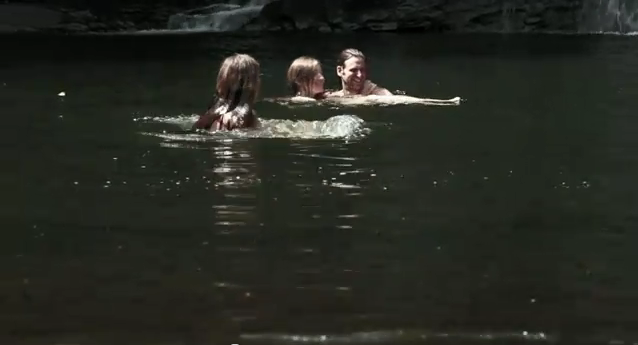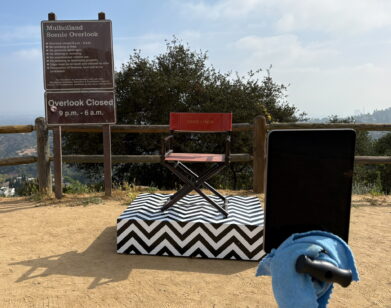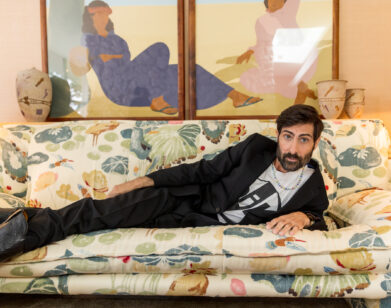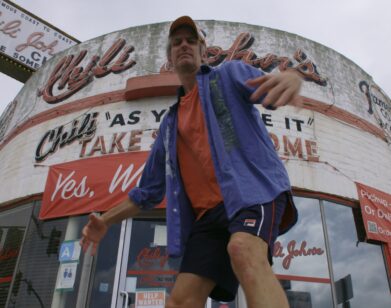Hey Jealousy! Green Director Sophia Takal

Hours before winning the Chicken & Egg Emergent Narrative Woman Director Award last week at South by Southwest, Brooklyn-based writer, director, and co-star of Green, Sophia Takal, spoke candidly to Interview about her debut feature: “Jealousy turns people into monsters, and from the start of shooting, I really liked the idea of having a horror-movie tone.” While devoid of actual gore, Green yields the genre’s mood through a series of menacingly long takes, a fateful, almost indelicate score, and subtle acting that both delays and foretells threat.
Fleeing her disaffecting and intellectual New York life for an unnamed countryside town, Genevieve (Kate Lyn Sheil) accompanies her sometimes smug and self-serving journalist boyfriend, Sebastian (Lawrence Michael Levine), as he dives into his latest project: sustainable farming. Isolated, bored, and pushed aside, Gen meets Robin (Takal), a chatty local whose goofy affability is at first odd and uninvited. The women soon bond, but as Sebastian starts spending time with Robin too, Gen is suddenly drowned by irrepressible envy that induces paranoid, sexual delusions. Sheil’s haunting performance is especially terrific (and deceivingly gossamer in some scenes.) Like Green‘s rural, forest setting—both beautiful and imposing—Sheil pivots between soft-spoken acquiescence and stern, hounding hostility.
DURGA CHEW-BOSE: In your director’s statement, you’re bracingly honest about why you made this film—to try and work through your destructive pull towards intense jealousy. It’s rare that we see a female filmmaker tackling this subject.
TAKAL: I mean, there are a lot of movies about women’s psychology and you’re right, I think almost all of them are directed by men. Like 3 Women or Images, but those are both Robert Altman, or like Persona by Bergman. So many of the great ones are by men. I mean they all really spoke to me and are amazing movies, but I feel like there’s something that they don’t understand even if they do a great job.
CHEW-BOSE: What did you feel is missing from them? Or is it that…
TAKAL: I don’t think is anything is missing from those movies in particular. But I just think it’s a really unique thing to women, this weird psychotic jealousy. [laughs]
CHEW-BOSE: And how deep and perverse it can get very fast?
TAKAL: Yeah, yeah. And so I thought it would be interesting to look at that.
CHEW-BOSE: So in making Green, did you need to rehearse a lot before considering that Sebastian’s character is played by your fiancé and Genevieve’s character is played by your roommate?
TAKAL: We just went out there and started shooting. I had a script, and most of it was dialogue that was written, but some of it was outlined. It was my first week ever directing—I had directed shorts with [Lawrence] before—but it was my first time really directing, so I wasn’t particularly articulate that first week. I came back for a second week, reshot things, and felt a lot more confident with what I wanted. I had a really hard time asserting myself sometimes, saying, “No, this is what I want,” or “This is right.” I wonder if it was about being a woman director or because I felt so inexperienced.
CHEW-BOSE: It’s a tight script; not much mumbling or struggling to find the words, which makes the duelling between the women especially palpable.
TAKAL: Yeah, I tried.
CHEW-BOSE: And it was edited in that same tight way. I especially liked that scene where all three of them are in the lake and Gen says to Sebastian, “I think [Robin’s] really pretty.” It’s on the surface a harmless comment, but so true to how a jealous person might test the waters!
TAKAL: [laughs] Totally!
CHEW-BOSE: In terms of Robin’s character, why did you choose to give her a Southern accent?
TAKAL: I just wanted the two women to superficially be as different as possible. I wanted the couple to be really far away from New York. We shot in Pennsylvania, but setting it in Pennsylvania felt too close, like she could have escaped back to New York. And I wanted her to feel really isolated, and I wanted [the two women] to come from totally different backgrounds, so that their friendship was based more on sort an indescribable shared experience, or maybe just out of necessity.
CHEW-BOSE: Can you speak a bit about the conversation Gen and Robin have when they’re talking about their horrible experiences with pervy bosses? I was wondering why you chose that as the moment where the two women finally connect.
TAKAL: Definitely in movies, girls talk about boys all the time. And even in real life, I feel like a lot of my conversations revolved around—or maybe not now because I’m getting a little older—obsessing over boys. So I kind of wanted to have something like that; girls connecting over boys, but sort of twist it a little bit and make it about how they were…
CHEW-BOSE: Treated by men?
TAKAL: Yeah, treated by men. I had had the same experience that Genevieve with a disgusting boss, and I wanted to put that in a movie because it seems like everyone has had that experience.
CHEW-BOSE: The dialogue in Green is eerily plain, yet the story never feels too static or slow, or rambly.
TAKAL: All my friends make really small, naturalistic, dialogue-heavy movies, so I’m kind of used to that. I didn’t want it to be rambly and I didn’t want it to be cutesy, or quirky, or clever. I tried to make it seem like real conversation.
CHEW-BOSE: Throughout the film, the shots are held for a really long time. Almost every important exchange that has to do with paranoia or sexuality and tension, you held for a long time. Is that something you’re really attracted to in film and narrative, as a director?
TAKAL: I got really attracted to it for this movie, like I knew I wanted to shoot as much as possible in one scene. And I knew I could do it because Kate and Larry are amazing actors, and our DP was amazing and he knew the camera really well. I wanted to push it as much as possible. And I love editing, and I don’t mind when things are edited and you can see the editing, but I thought for this, I wanted it to be so unmeditated. I feel like any time there’s a cut, subconsciously [the audience] resets, and I didn’t want the audience to reset during the scenes.
CHEW-BOSE: Was it difficult deciding where to place the scenes where Gen begins experiencing these paranoid visions of Robin and Sebastian having sex?
TAKAL: That was the biggest struggle for me, because I showed a lot of different cuts to people and women understood it right away, but all the guys were like, “The jealousy comes out of nowhere,” and “Why are we seeing this?” And they really didn’t understand it, and so I struggled in making it seem that her jealousy was unjustified in a way, and coming just from her mind and sort of out of the blue, but also not making it so abrupt that it took it people out of the movie. We also played with not even including the sexual fantasies. You can understand intellectually from Kate’s performance but I thought it was important to see how jealous she was becoming.
CHEW-BOSE: How have guys reacted to it now?
TAKAL: So now that it’s over, guys really like it. One guy came up to me and was like, “My girlfriend’s really jealous and I wanted to think that it was some lame stereotype but this made me realize that girls are like this!” I don’t necessarily think that’s true…
CHEW-BOSE: Do you worry that you made a film that might actually fuel that stereotype of jealous girls?
TAKAL: I don’t, because I think a fear of portraying something negatively ends up creating more stereotypes. Know what I mean? Like a fear of going into these negative feelings that I have had and a lot of women that I’ve spoken to have had creates these sort of plasticky women. I think it is a feminist movie, or at least a movie with a female perspective.
CHEW-BOSE: How do you feel about Green being your directorial debut; does it represent the filmmaker you want to be?
TAKAL: It’s really weird. I was making this movie and I was just like, this doesn’t feel like it’s coming from me at all. Like I really like Woody Allen, I really like John Cassavetes, and I really like movies that are super-naturalistic, but this just felt really right, and I’m really happy with it. I studied film studies in college, but I slept through all the movies [laughs], and I love film but I don’t have a lot to reference. And so I don’t know what my influences are and I don’t know where this came from at all, but it feels… I really like it. Afterwards, a lot of people started asking me about this woman director thing, which I never thought about before. And I’d never really thought about how there aren’t really many female directors. I knew it, but I’d never really sat down and thought about the implications of that, and what it meant for a woman to make a movie, and how it’s viewed differently when a woman makes a movie about women. Now I feel like it is really important to do that, and so I’m starting to think of other movie ideas.
CHEW-BOSE: In making Green, do you think you overcame your own issues with jealousy?
TAKAL: I tried, but I don’t know if I’ve totally overcome it. Like Kate, she’s beautiful, she’s talented, she’s in two movies here, of course I’m jealous of her! [laughs] I also really love her, and I’m trying to be really supportive. And that’s the other thing about this movie, by acknowledging that these feelings exist I feel like then you see it, and you recognize that in yourself. You know, I think not acknowledging things is what causes inner turmoil. Being open about it is really liberating.






